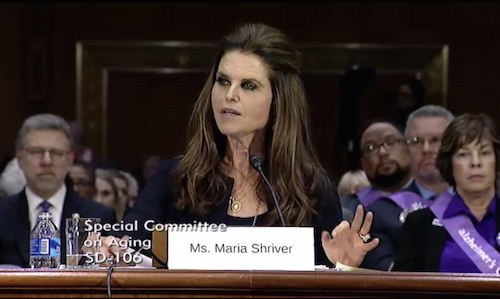
Cutting the National Institutes of Health budget by $5.8 billion as proposed by President Donald Trump would be a setback to dementia research and “is the last thing we should do,” Sen. Susan Collins (R-ME) said at a Wednesday hearing of the Senate Special Committee on Aging that focused on Alzheimer’s disease.
Collins, who chairs the committee, noted that the previous Congress increased funding for Alzheimer’s research by 60% to almost $1 billion and that the fiscal year 2017 appropriations bill calls for almost $1.4 billion in Alzheimer’s funding, putting the amount closer to the $2 billion experts say is needed annually.
Under a fiscal year 2018 budget proposed by the administration, the NIH would receive a total of $25.9 billion, which is $5.8 billion less than in 2017. Overall, the Department of Health and Human Services, of which the NIH is a part, would see its funding cut by $15.1 billion, an 18% reduction.
“We certainly cannot afford to go backwards at a time of such great urgency and progress,” Collins said. “And that is why I so strongly oppose the administration’s plan to slash funding for the National Institutes of Health. It is the last thing we should do.”
Alzheimer’s currently is the country’s costliest disease, she said, but NIH-funded research ultimately could result in savings to the government if it uncovers ways to prevent, treat or cure the disease.
“The United States spends more than $259 billion per year [on Alzheimer’s], including $175 billion in costs to the Medicare and Medicaid programs,” Collins said. “It is the only one of our nation’s most deadly diseases without an effective means of prevention, treatment or a cure. If we do nothing, the Alzheimer’s Association forecasts that this disease will cost our country an astonishing $1.1 trillion by 2050, and it will bankrupt the Medicaid and Medicare programs.”
By that time, she said, as many as 14 million Americans could have the disease.
Hearing witness Maria Shriver, a journalist and former first lady of California who founded the Women’s Alzheimer’s Movement, noted that she previously had appeared before the committee in 2009, six years after her father had received an Alzheimer’s diagnosis and two years before he died.
“Believe me, I wish I did not have to come back here to testify,” she told committee members. “It wasn’t on my calendar, but when I learned that the funding for NIH and Alzheimer’s research might be in jeopardy, I practically ran here to say, ‘This just cannot be. Wait a minute. There must be some mistake here.’ ”
The number of deaths from Alzheimer’s disease has increased 89% since the year 2000, Shriver said, while deaths from breast cancer, prostate cancer, heart disease and stroke have decreased. Alzheimer’s, she said, “is bankrupting families, and it’s on its way to bankrupting this country.”
The other committee members attending the hearing — Sens. Richard Blumenthal (D-CT), Bob Casey (D-PA), Catherine Cortez Masto (D-NV), Thom Tillis (R-NC) and Elizabeth Warren (D-MA) — all pledged to fight with Collins to prevent the proposed NIH budget cuts. Casey, the committee’s ranking member, said that other senators feel the same way. Tillis went so far as to tell Shriver: “I promise you: Those NIH cuts? They’ll never happen.”
Casey, Shriver and other hearing witnesses noted the importance of a properly trained workforce to care for those with Alzheimer’s, and they also discussed family caregivers and research. A recording of the hearing is posted online.



